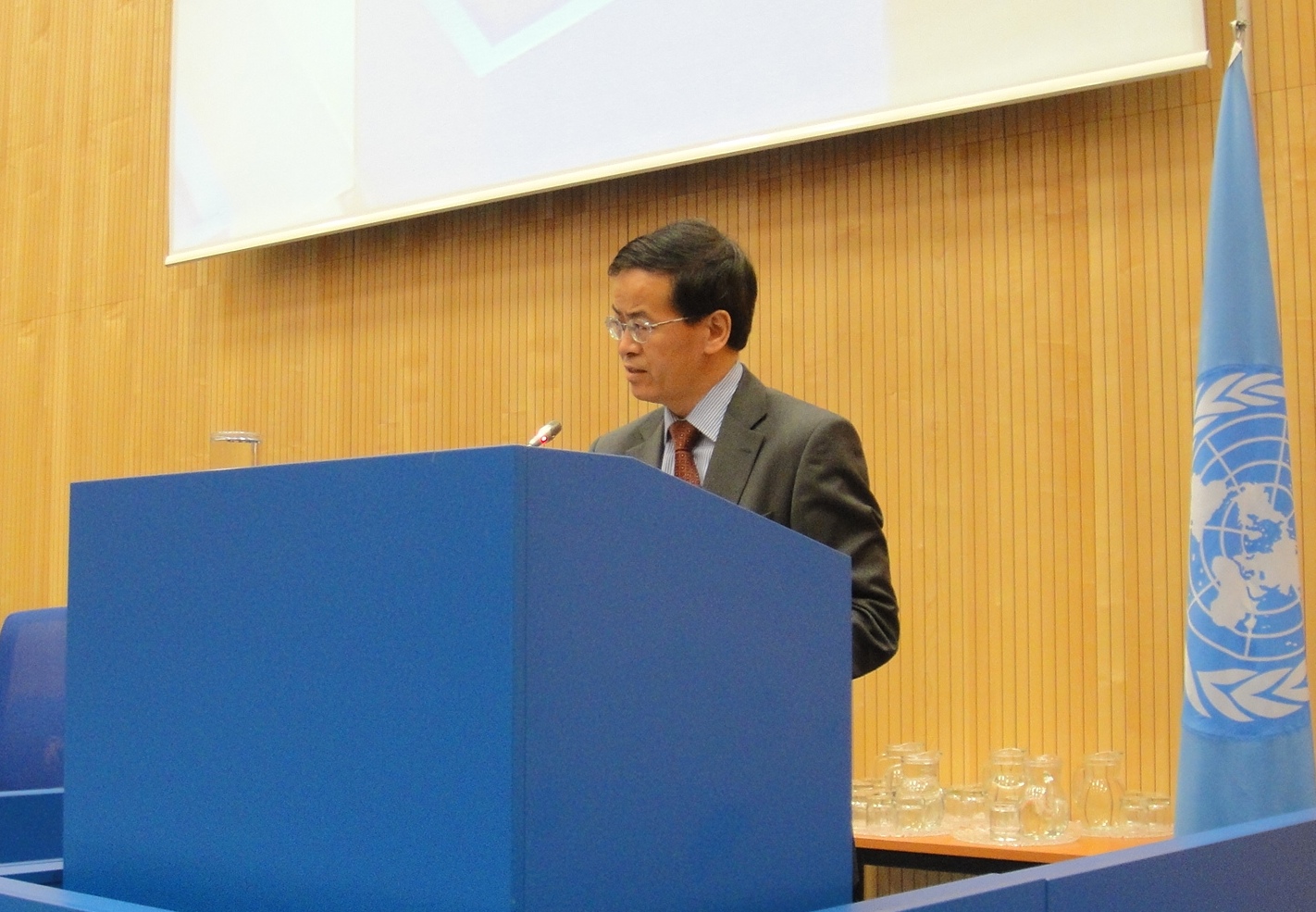成竞业大使代表亚洲组在联合国麻醉药品委员会第56届会议开幕式上发言
3月11日,联合国麻醉药品委员会第56届会议在维也纳召开。成竞业大使代表亚洲组国家在开幕式上致辞,强调国际禁毒形势依然严峻,呼吁各国继续以三项禁毒公约为依据,基于共同分担责任的原则,就预防和遏制毒品犯罪进一步加强合作。

成大使发言如下:
Mr. Chairman
On behalf of the Asian Group, I would like to take this opportunity to express my warm congratulations to you and to other members of the Bureau, on your election. I assure you of the Group’s full support and cooperation.
The Group would also like to thank the Secretariat for its excellent work in preparation for this session of the Commission.
Mr. Chairman
The Group notes that, despite continued international efforts, certain worrying trends in relation to the world drug problem are clearly discernable. These include an increasing shift towards synthetic drugs including new psychoactive substances and resurgence of illicit crop cultivation in certain regions. In this regard, the Group underlines the importance of further strengthening national and international efforts in dealing with the world drug problems, on the basis of the three international drug control conventions and the Political Declaration and Plan of Action.
As indicated in the Political Declaration and Plan of Action, a high-level review of its implementation will be conducted in 2014. The high-level review is an opportunity to reiterate our commitment towards fighting the world drug problems. In this context, the Group looks forward to constructive and fruitful consultations among Member States and expresses its confidence that the High-Level Review Process shall be fruitful and result-oriented.
Mr. Chairman
The Group emphasizes the importance of continuing and further strengthening regional and inter-regional cooperation, especially in the context of illicit drugs related exchange of information, policy coordination and operational cooperation. The Group notes with appreciation the effective role being played by ASEAN Ministerial Meeting on Transnational Crime, the Central Asian Regional Information and Coordination Center, Economic Cooperation Organization, the Meeting of Heads of National Drug Law Enforcement Agencies of Asia and the Pacific, the Memorandum of Understanding on Drug Control in the Greater Mekong Sub-region, Shanghai Cooperation Organization, South Asian Association for Regional Cooperation and Triangular Initiative in this regard.
The Group emphasizes that alternative development is an important, lawful, viable and sustainable option for preventing, eliminating or reducing the illicit crop cultivation, and should be implemented as an integral part of broader illicit drug control policies, including demand reduction, law enforcement, illicit crop eradication and awareness raising.
In this connection, the Group takes note with interest of the initiative by the Governments of Thailand and Peru to present to the United Nations General Assembly the Lima Declaration on Alternative Development and the International Guiding Principles on Alternative Development, which were adopted at the High Level International Conference on Alternative Development, held in November 2012 in Lima, Peru, for adoption by the United Nations General Assembly as the United Nations Guiding Principles on Alternative Development.
The Group expresses its concern over the threats and challenges posed by the emergence of new psychoactive substances. According to the INCB Report 2012, many countries face impediments in controlling the abuse of new psychoactive substances. The Group would like to draw the Commission’s attention to INCB’s recommendations in its Annual report of 2012 wherein it encourages UNODC and WHO to make continuous efforts towards assisting the Member States in dealing with this threat.
The Group notes with regrets that the WHO Expert Committee on Drug Dependence (ECDD), in its 35th meeting convened in June 2012, concludes that the international control for Ketamine is not really necessary at present. However, the Group is worried about the fact that the diversion and abuse of Ketamine still threatens health and well-being of the societies especially youth in many countries, in particular East and South East Asia region. In this regard, the Group requests the Commission to further engage the ECDD for its reviewing the conclusion and further considering the necessity and urgency of establishing international control of Ketamine.
Mr. Chairman,
The Group expresses its support to the extension of the term the Inter-Governmental Working Group to Improve the Governance and Financial Situation of the UNODC (FINGOV). As its practice shows, this mechanism provides invaluable opportunities to all member states to follow closely the working process of the UNODC and engage in meaningful discussion on optimizing the management and funding of drug control programmes.
The Group appreciates the efforts made by UNODC in implementing its regional and thematic programmes and looks forward to its further progress under the guidance of the Mid-Term Strategy for the period 2012-2015. To that end, joint efforts should be made by the Member States to improve financial situation of UNODC in order to allow the Office to fulfill its mandate and to facilitate effective implementation of its programmes.
Thank you, Mr. Chairman.